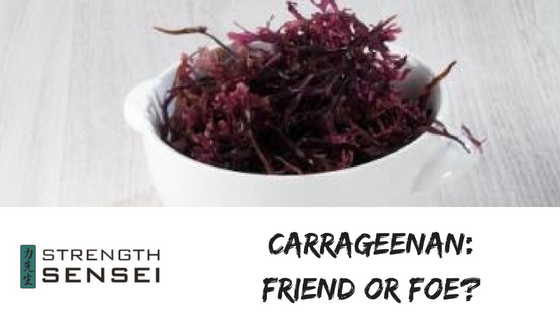Carrageenan has been a debated subject among health advocates and health-conscience consumers in recent years. Some individuals may have brushed this topic aside as just another controversial ingredient, but this one may actually deserve our attention. It’s purported health dangers strike at the heart of many chronic health issues – namely, chronic, systemic inflammation. To further raise alarm, in November 2016, the USDA’s National Organic Standards Board (NOSB) voted to remove carrageenan from the list of allowed substances in organic food, after an investigation that began in April 2016. The issue of carrageenan is larger than originally suspected because this ingredient is found profusely within organic foods, exposing millions of unsuspecting, health-conscious individuals to its potential hazards. Therefore, healthcare practitioners owe it to their patients to be informed about this ingredient and its potential role in health problems.
What is Carrageenan?
Carrageenan did not initially raise alarm in many individuals because it seemed to be a “natural” and harmless additive, even dubbed safe by the NOSB since the mid-1990s. After all, what harm can come from sulphated polysaccharides extracted from red edible seawood (aka. Irish moss)? Apparently, a great deal.
The gelatinous extracts of seawood have been used for centuries as a food additive. They effectively bind proteins and act as thickening and stabilizing agents. Carrageenan has been used extensively in milk alternatives such as almond and coconut milk, organic dairy products including yogurt and ice cream, organic infant formulas, soy products, and can be a vegan alternative to gelatin.
Inflammation, Diabetes, and Cancer
Joanne K. Tobacman, MD began investigating carrageenan and its effects on the human body in the late 1990s and repeatedly discovered alarming results. She published several peer-reviewed studies that linked low dose carrageenan exposure to gastrointestinal inflammation leading to systemic inflammation, impaired glucose intolerance and insulin function, and associations with malignancies. In 2012, Dr. Tobacman brought her research before the NOSB for reevaluation of this additive in organic foods. The warnings were disregarded until consumer demand drove further evaluation.
A quick PubMed search, using the terms “carrageenan AND inflammation” reveals an astounding number of studies that utilizes carrageenan to induce paw inflammation in rats, for the purpose of studying the effectiveness of anti-inflammatory pharmaceuticals. Most of these studies use degraded carrageenan, which is processed with acid, as opposed to the food-grade, undegraded carrageenan, which is processed with alkali. However, questions have been raised regarding the potential transformation of “safe” undegraded carrageenan to the “unsafe” degraded carrageenan when this additive encounters the hydrochloric acid of the stomach. Degraded carrageenan has been a well-known carcinogen since 1982, raising concerns about the carcinogenic potential of consumed, undegraded carrageenan.
When the innate immune system is stimulated and chronic inflammation ensues, cancer is not the only health risk implicated. Carrageenan’s pro-inflammatory properties are related to its ability to induce NF-κB activation and IL-8 secretion and increase necrotic, non-apoptotic cell death, similar to the natural inflammatory response mediated by tumor necrosis factor (TNF)-α. These pathways have been implicated in various chronic inflammatory conditions such as rheumatoid arthritis, inflammatory bowel disease, irritable bowel syndrome and colitis. Interestingly, several case studies have reported significant improvement in gastrointestinal symptoms ranging from bloating to severe ulcerative colitis when carrageenan was eliminated from the diet.
Carrageenan & Inflammation
Carrageenan has long been recognized for its inflammatory properties, but now studies are confirming its strong link to the development of diabetes. According to a 2012 study in the journal, Diabetologia, “glucose tolerance was significantly impaired in carrageenan-treated 12-week-old mice compared with untreated controls at all time points…” and during an insulin tolerance test, “glucose levels declined by more than 80% in controls, but not in carrageenan-treated mice.” This study revealed markedly impaired glucose tolerance, insulin resistance, and inhibited insulin signaling in rats given food grade carrageenan in low doses that would mimic that consumed as a food additive. Further, this study concluded these effects were a result of carrageenan-induced inflammation. A 2015 study in the Journal of diabetes research, added another component to this investigation. Not only did carrageenan exposure result in glucose intolerance and elevated fasting glucose, but these effects were expedited in the presence of a high fat diet. When compared to a high fat diet alone, carrageenan exposure resulted in greater diabetes risk factors, and much sooner, suggesting that it may be one potential cause of diabetes in nonobese subjects.
With the rise in gastrointestinal conditions and other health maladies associated with chronic, systemic inflammation, it seems carrageenan shouldn’t just be laid aside as yet another debatable ingredient, but rather, it deserves some scrutiny by the healthcare practitioner, keeping in mind that many unsuspecting ‘victims’ of carrageenan exposure may be the health-conscious, organic food consumers.
By Nicole Spear, MS, CNS



Recent Comments